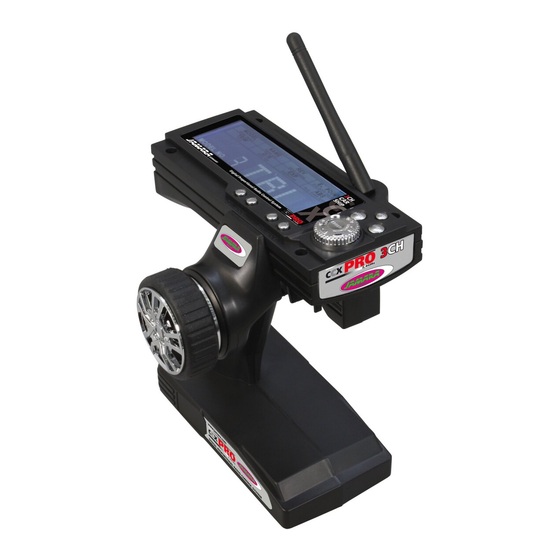LED
Ricevente
Receiver
IT - Allacciare la trasmittente alla ricevente
In un moderno sistema di 2,4 GHz, è indispensabile che la trasmittente e la ricevente vengano
connesse insieme a bordo del modello. La ricevente accetta quindi solo i segnali della trasmittente.
Se per qualsiasi motivo si dovesse effettuare un nuovo allacciamento "connessione", eseguire le
seguenti operazioni:
A.
Sostituire nella trasmettente le batterie scariche con altre cariche o nuove. Lasciare spenta la
trasmettente.
B.
Inserire la spina di accoppiamento in dotazione nell'uscita del canale 3.
C.
Accendere la ricevente, collegando le batterie alla stessa ricevente. Il LED della ricevente inizia
a lampeggiare, indicando che la ricevente è pronta in modus "connessione".
D.
Tenere premuto il pulsante di connessione sulla trasmittente, mentre si accende la stessa.
E.
Controllare il led sulla ricevente, non appena cessa di lampeggiare, il processo di connessione
ha avuto successo. Questo processo può richiedere fino a 5 secondi.
F.
Rilasciare il pulsante di connessione della trasmettente e rimuovere la spina di connessione
nella ricevente. Spegnere la ricevente e la trasmittente.
G.
Installare correttamente tutti gli accessori e controllare con molta attenzione.
H.
Se la funzione non avesse successo, ripetere la procedura di connessione.
LED
Ricevente
Receiver
Programmazione del gruppo integrato di FailSafe
1. Descrizione della Funzione
L'unità FailSafe è concepita principalmente per l'utilizzo sulle imbarcazioni e sui veicoli. Serve per
evitare la perdita del modello, determinando la chiusura del gas, nell'eventuale assenza di segnale.
Se la ricevente perde il segnale della trasmittente, il servo del gas o regolatore di velocità ritorna
automaticamente sulla posizione programmata inizialmente.
2. Impostazione
a.
Accendere la trasmittente
b.
Accendere la ricevente. Il segnale LED lampeggia continuamente e indica che la ricevente è
pronta.
c.
Spostare sul trasmettitore la leva dell'acceleratore nella posizione di freno, o zona spento nel
regolatore di velocità. Tenere la leva del gas su questa zona.
d.
Premere il pulsante Imposta sul ricevitore. Il segnale LED lampeggia per 3 secondi
(vedi illustrazione a sinistra).
e.
L'impostazione è salvata e si può portare la leva dell'acceleratore in posizione neutra.
3. Prova delle impostazioni
a.
Accendere la trasmittente.
b.
Accendere la ricevente.
c.
Spegnere la trasmittente.
d.
Ora la ricevente perde il segnale e conduce il servo del canale gas o il regolatore di velocità
sulla posizione in precedenza programmata.
e.
Seguire la procedura descritta sopra, il processo FailSafe funziona correttamente.
4
Batteria
Battery
Spina allacciare
Binding Plug
Batteria
Battery
Spina allacciare
Binding Plug
GB - Binding
As with all modern 2.4GHz R/C systems the receiver must be bound to the transmitter to ensure that
the receiver will only react to signals from that transmitter.
If you wish to re-bind the receiver with the transmitter please proceed
as follows:
A.
Ensure that the transmitter is fi tted with fresh or fully charged
batteries and leave the transmitter off.
B.
Plug the binding plug (included) into the channel 3 socket on the
receiver.
C.
Switch the receiver system on by connecting the battery.
The receiver LED will begin to fl ash indicating that the receiver is in
bonding mode.
D.
Press and hold down the binding button on the transmitter while
switching it on.
E.
Watch the receiver LED and once it stops blinking the binding
process is copmlete.
This process may take up to 5 seconds.
F.
Release the binding button on the transmitter and disconnect the
binding plug from the receiver. Set the receiver and transmitter.
G.
Install all of the components correctly and carefully check that
everything is operating correctly.
H.
If the receiver fails to bond or does not function after bonding
repeat the above procedure until a successful bonding is achieved.
Programming of the integrated FailSafe unit.
1. Function Description
The built-in FailSafe unit is mainly for the use on boats and cars. It is used to prevent loss of the
model in case of signal loss and returns the servo to the position which was set before.
2. Setting
a.
Turn on the transmitter
b.
Turn on the receiver. The signal LED will flash continuously and
indicates that the receiver is ready.
c.
Move the throttle lever on the transmitter in the braking or outlet position.
Hold the throttle lever in this position.
d.
Press the Setup button on the receiver. The signal LED flashes for 3 seconds (see left).
e.
The setting is saved and you can bring back the throttle into neutral position.
3. Testing the settings
a.
Turn on the transmitter.
b.
Turn on the receiver.
c.
Turn off the transmitter.
d.
The receiver will now lose the signal and drives the servo or the
speed control on the gas channel to the previously programmed
position.
e.
If these steps work, you have set the FailSafe.
Pulsante incorporare
Binding Button
Fail Safe
LED

